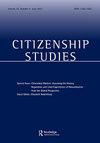后记:疫情时期的公民身份
IF 1.9
3区 社会学
Q3 POLITICAL SCIENCE
引用次数: 0
摘要
尽管这本特刊的作者们关注的是疫情,但他们都集中在公民身份研究领域长期以来的一个问题上:公民身份是如何经常达不到它所承诺的,尽管它继续激励人们向各州提出要求。《世界人权宣言》从政治和公民权利的角度,以及更具争议的社会和经济权利以及文化权利的角度阐述了各国应如何对待公民的蓝图。后来的条约试图规定各国应如何对待其领土上的非公民,但并非所有国家都签署了这些条约,即使是那些签署了条约的国家也很少履行其所有条约义务。与此同时,包括联合国在内的国际机构非常不愿意规定各国何时首先允许人们获得公民身份或永久居留权等其他身份。这场疫情及其对健康、福祉和基本自由的影响,使人们对各国如何平等对待公民和非公民的所有这些方面都有了深刻的认识。作者证明,非公民在许多情况下表现不佳,尽管巴祖利和坎波莫蒂观察到,意大利各地区的强迫移民待遇差异很大,而金、崔和首尔惊讶地发现,韩国的无证移民受到的关注比预期的要多。其他作者发现,各州对待不同公民群体的方式存在差异。Surova描述的罗姆人在斯洛伐克的经历最令人不寒而栗,而Mookerjee则讲述了印度非正规工人返回农村家园时受到的虐待。可能会发现,在许多全球背景下,边缘公民几乎没有得到比非公民更好的待遇。国家虐待非公民和边缘公民的行为经常受到公民的赞扬,他们认为他们不值得国家保护,将自己的困境归咎于他们,或将他们污蔑为传染源。那些强烈反对国家对广大人口进行监测的公民,经常批准他们所在的州采取严厉措施,旨在遏制病毒在特定群体中的传播。斯洛伐克又是一个例子,那里部署了警察和军队封锁罗姆人社区。另一个是在美国,Hallett和Otero Asmar记录了俄亥俄州一名治安官如何在疫情之前和期间通过与ICE签订分包合同拘留和驱逐无证移民来吸引当地选民。这也是公民身份。本文章由计算机程序翻译,如有差异,请以英文原文为准。
Afterword: citizenship in pandemic times
Though focused on the pandemic, the authors of this special issue all dwell on a longstanding concern of the field of Citizenship Studies: how citizenship has so often fallen short of what it seems to promise, even as it continues to inspire people to make demands on states. The Universal Declaration of Human Rights sets out what was in effect a blueprint for how states should treat their citizens, phrased in terms of political and civil rights, and then, and more controversially, in terms of social and economic rights, as well as cultural rights. Later treaties sought to stipulate how states should treat non-citizens in their territory, yet not all states have signed these, and even those that do have seldom made good on all their treaty obligations. International bodies including the UN are, meanwhile, deeply reluctant to prescribe when states are to admit people to citizenship in the first place, or to other statuses such as permanent residency. The pandemic – with its implications for health and well-being and for basic freedoms – brought sharply into perspective all these aspects of how states are to treat citizens and non-citizens alike. The authors demonstrate that non-citizens fared poorly in many contexts, although Bazurli and Campomoti observe that forced migrants’ treatment varied considerably across Italian regions, while Kim, Choi and Seol were surprised to find that undocumented migrants in South Korea received more attention than expected. Other authors find disparities in how states treated different groups of their own citizens. The Roma’s experience in Slovakia described by Surova is the most chilling, while Mookerjee recounts the ill-treatment of informal workers in India returning to their rural homes. It may transpire that marginal citizens received little better treatment than non-citizens in many global contexts. States’ ill-treatment of both non-citizens and marginal citizens was often applauded by citizens who considered them to be ill-deserving of state protection, blaming them for their own predicament or stigmatizing them as a source of contagion. The same citizens who objected vociferously to state surveillance on the population at large, often approved their states’ use of harsh measures that purported to contain the spread of the virus among and out of specific groups. Slovakia is again an example, where police and army were deployed to lock down Roma neighborhoods. Another is the US, where Hallett and Otero-Asmar record how an Ohio sheriff appealed to local voters by sub-contracting with ICE to detain and deport undocumented migrants, before and during the pandemic. This, too, is citizenship.
求助全文
通过发布文献求助,成功后即可免费获取论文全文。
去求助
来源期刊

Citizenship Studies
POLITICAL SCIENCE-
CiteScore
3.60
自引率
11.10%
发文量
85
期刊介绍:
Citizenship Studies publishes internationally recognised scholarly work on contemporary issues in citizenship, human rights and democratic processes from an interdisciplinary perspective covering the fields of politics, sociology, history and cultural studies. It seeks to lead an international debate on the academic analysis of citizenship, and also aims to cross the division between internal and academic and external public debate. The journal focuses on debates that move beyond conventional notions of citizenship, and treats citizenship as a strategic concept that is central in the analysis of identity, participation, empowerment, human rights and the public interest.
 求助内容:
求助内容: 应助结果提醒方式:
应助结果提醒方式:


